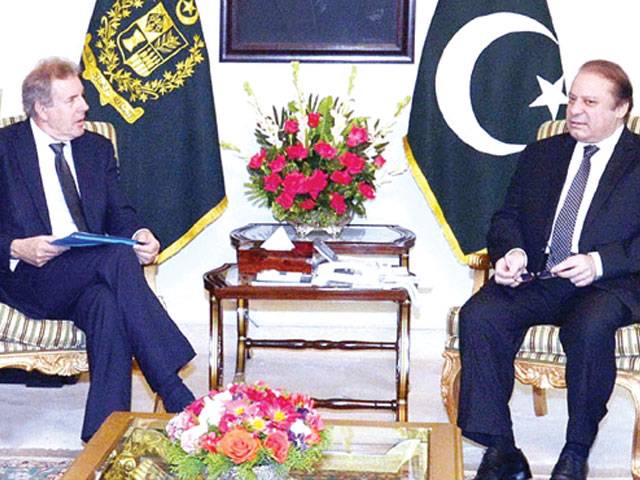ISLAMABAD - Prime Minister Nawaz Sharif has said that Pakistan believes in the policy of non-interference, supports the democratic process in Afghanistan and that no one will be allowed to use Pak soil against Kabul.
The prime minister made these remarks here Wednesday during a meeting with UK National Security Adviser Kim Darroch who called on him at the PM House. General Sir Nicholas Houghton, Chief of Defence Staff, Simon Gass, Special Representative on Afghanistan and Pakistan, HE Philip Barton, British High Commissioner, Sartaj Aziz, Adviser to PM, and Tariq Fatimi, Special Assistant to PM also attended the meeting.
Nawaz Sharif said: “We do not want to fall into arms race and seek peace and stability in the region. There is a need to enhance investment in social sectors of health and education and we have taken steps towards these ends. The PM appreciated UK’s support for Pakistan in social sector.”
The prime minister said Pakistan was facing huge challenges. The major issues faced by Pakistan are economy, energy and terrorism. “Our progressive policies have shown positive impacts on the economy, while we have taken concrete steps to overcome the energy crisis. In order to tackle the issue of terrorism, we have evolved consensus among all the stakeholders, for dialogue,” the PM asserted.
Kim Darroch said the United Kingdom supports the objectives of Pakistan’s internal security. He also expressed his confidence in Pakistan’s economic policies and added the economy was poised to take off. Kim Darroch said his country supports the objectives of Pakistan’s internal security.
In another development, Sir Kim Darroch, UK National Security Adviser and General Sir Nicholas Houghton, Chief of Defence Staff British Armed Forces called on Chairman Joint Chiefs of Staff Committee (CJCSC) General Rashad Mahmood and Chief of Army Staff General Raheel Sharif, separately.
According to ISPR, General Sir Nicholas Houghton called on Gen Rashad Mahmood, Chairman Joint Chiefs of Staff Committee (CJCSC). The two dignitaries discussed matters related to regional security and mutual cooperation between the two armed forces.
They also called on Chief of Army Staff General Raheel Sharif at General Headquarters. During the meeting, wide range of issues of mutual interest, including defence and security cooperation and measures contributing to regional stability, came under discussion. Special Representative for Afghanistan and Pakistan Simon Gass and British High Commissioner Philip Barton were also present during the meeting.
Meanwhile, Federal Defence Minister Khawaja Asif said on Wednesday both political and armed forces’ leaderships were on the same page over all matters, including the internal security situation of the country.
“This unanimity is proving our strength and will help solve our problems,” he remarked during his meeting with the national security adviser of the United Kingdom, Sir Kim Darroch, in his office here.
He said violence in any form was undesirable and government was privy to it, adding, “We want to give peace a chance.”
The minister said Pakistan considered the United Kingdom a close friend and development partner and citizens acted as a living bridge between the two countries. “The recent visit of British Prime Minister David Cameron is a testimony to our strong relationship,” he said.
“Pakistan and United Kingdom are progressing through Enhanced Strategic Dialogue (ESD) which covers the entire spectrum of bilateral relations. Other defence forums like Defence Cooperation Forum and PAK-UK Naval Staff talks also hold great significance in cementing the bilateral ties,” said a press release issued here.
Sir Kim Durroch expressed the hope at the reactivation of Joint Working Group on Counterterrorism and stressed that relations would continue to get boost on principles of mutual trust, shared common interest and understanding each other’s perspective. Khawaja Asif highlighted the role of Pakistan as a stabilising factor in the wake of drawdown 2014 and said that Pakistan wanted stable and peaceful Afghanistan which was important for the region and Pakistan, in particular.
The minister also highlighted sacrifices rendered by the armed forces and people of Pakistan in terms of men and material and said the country was trying its best to play a neutral role and normalise relations with all stakeholders and neighbours in the region.
Tuesday, April 16, 2024
PM reaffirms non-interference in Afghanistan
| Tells UK national security adviser Pakistan against arms race

Caption: PM reaffirms non-interference in Afghanistan
Pakistan, IMF discussing new multi-billion-dollar program, says Finance Minister Aurangzeb
11:09 AM | April 16, 2024
LESCO ‘bars’ officers from appearing before FIA in overbilling probe
10:49 AM | April 16, 2024
Aleem Khan, Kamran Tessori discuss matters of mutual interests
10:40 AM | April 16, 2024
Global brands facing challenge from local contenders in Pakistan's FMCG market
10:24 AM | April 16, 2024
Israeli Air Force finalizes preparations for possible attack on Iran
8:21 AM | April 16, 2024
Political Reconciliation
April 16, 2024
Pricing Pressures
April 16, 2024
Western Hypocrisy
April 16, 2024
Policing Reforms
April 15, 2024
Storm Safety
April 15, 2024
Democratic harmony
April 16, 2024
Digital dilemma
April 16, 2024
Classroom crisis
April 16, 2024
Bridging gaps
April 16, 2024
Suicide awareness
April 15, 2024
ePaper - Nawaiwaqt
Advertisement
Nawaiwaqt Group | Copyright © 2024





